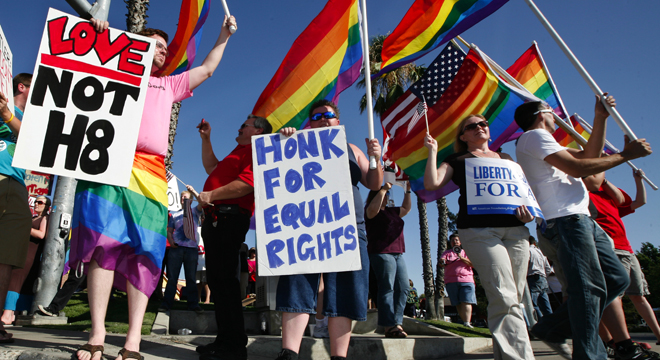The Supreme Court is expected to soon dive into the battle over gay marriage.
The Court will meet on Friday to decide whether or not to consider the constitutionality of the Defense of Marriage Act — the 1996 law that bars federal recognition of same sex marriage. It will announce next week the cases it has decided to consider, and experts see few reasons why DOMA won’t be among them.
Two federal appeals courts have invalidated Section 3 of DOMA, which bars federal benefits for same sex couples, as a violation of equal protection under the Constitution. In a rare move for the executive branch, the Obama administration is pushing the Supreme Court to overturn the federal law and angling against implementing parts of it.
“The Supreme Court simply has to take a DOMA case,” said Adam Winkler, a constitutional law professor at UCLA. “It’s extremely rare for the Court to allow lower courts to strike down a federal law on such an important issue without weighing in.”
Brian Fitzpatrick, a professor at Vanderbilt University School of Law who formerly clerked for Justice Antonin Scalia, said, “I think the DOMA cases are probably on the higher end of the spectrum because the lower courts have struck down an act of Congress.”
Of the 10 gay marriage cases on the high court’s menu, eight of them deal with DOMA.
If the Court declines to render a final judgment, Winkler explained, “federal law will apply differently depending on where people live. Traditionally, the Court works hard to avoid such a lack of uniformity. It could also create a bureaucratic nightmare for the federal government, which will have to give benefits to some gay couples but not others.”
Fitzpatrick does however see a conceivable scenario in which the Court opts not to take up DOMA. Here’s what that would mean: the conservative justices would conclude they don’t have the votes to uphold DOMA, and the liberals would prefer not to risk losing the possible swing vote of Anthony Kennedy, since the lower courts have given them their desired outcome anyway. So the Court declines to hear any DOMA cases, meaning the appellate rulings would stand, giving liberals what they want for now but putting off a supreme judgment on the issue.
“Conservatives are probably afraid they will lose Justice Kennedy,” the former Scalia clerk said.
If the Supreme Court takes up DOMA, oral arguments will be held in the spring and a final decision will come by the end of June.
Of the other two same sex marriage cases the Court may consider: one involves California’s Proposition 8, the ballot measure passed in 2008 which amends the state’s constitution to ban recognition of same sex marriages; another deals with an Arizona law that, like DOMA, restricts benefits for same sex unions.
Prop 8 isn’t seen as a prime candidate for Supreme Court review, partly because it covers a narrow range of issues. If denied, the lower court’s ruling overturning it would stand.
“If the Court doesn’t take this case,” said Winkler, “it is a big win for gay rights because marriage will soon be legal again in the nation’s most populous state.”










